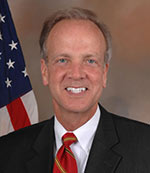
July 5, 2017
Q: As an advocate for general aviation, you have advanced many issues important to the industry. What are some examples?
A: General aviation (GA) is vital to our national economy and the future of rural communities, so GA’s issues impact not only Kansans, but citizens all across the country. I have worked to strengthen the GA industry throughout my time in Congress, as a member of the Transportation and Infrastructure Committee during my time in the House of Representatives, and today as a member of the Senate Commerce Committee.
In recent years, I have led legislative efforts to streamline FAR Part 23 small-airplane certification standards, which will decrease the regulatory burden on manufacturers and the costs of aircraft certification, and helped advance badly needed third-class medical reforms for GA pilots. During the last Congress, I offered legislation to protect federal grant funding for small airports so that these facilities are not penalized due to inconsistent commercial air service they cannot control.
Under a privatized ATC system, GA would forever be under the threat of higher, unfair fees and costs, with no opportunity for American citizens to affect change through their elected officials.
One effort I am particularly proud of is defending the FAA’s contract tower program from elimination under the Obama administration. Contract towers cost-effectively provide important safety services at 253 airports nationwide – including eight in Kansas – and save the FAA approximately $200 million annually.
I have also worked to preserve the accelerated five-year depreciation schedule for general aviation aircraft, which has been law for over a quarter of a century and directly benefits the 1.2 million Americans who make a living manufacturing and servicing these planes. Additionally, I have opposed attempts by both the Bush and Obama administrations to impose per-flight user fees on GA.
Q: The fact that Wichita, KS, is the ”Air Capital of the World“ is not the only reason you are a champion for general aviation, right?
A: People perceive me as a general aviation supporter because we manufacture so many airplanes in Kansas. While that is certainly an important component – GA manufacturing is Kansas’ largest industry – it is about more than simply manufacturing airplanes. In rural America, our ability to connect with the rest of the world is often determined by access to air service – both commercial and general aviation. Businesses in smaller communities throughout the country are able to remain where they are, growing local economies and creating jobs, because their small airport enables them to bring in customers and clients. If you care about the future of rural America, you need to also care about rural America’s airports.
Handing all authority over access to airspace, airport funding and investment, fees, charges and tower operations to a private board with no government or consumer recourse is a misguided idea that could very well create more problems than it solves.
Q: You were the first U.S. senator to oppose ATC privatization. Why?
While the notion of ”privatization“ sounds appealing from a conservative governing philosophy, the more I learned about the proposal to privatize ATC, the more concerned I became about the consequences for general aviation, along with the small airports and rural communities that GA serves. Under a privatized ATC system, general aviation would forever be under the threat of higher, unfair fees and costs, with no opportunity for American citizens to affect change through their elected federal officials.
Like many of my colleagues, I have had my frustrations with the FAA bureaucracy, which has caused significant delays in modernizing our ATC system. I believe the way to address these problems is with specific, targeted reforms. These reforms can be accomplished at a fraction of the cost to taxpayers of transitioning to a privatized ATC system.
Q: Why are unmanned aircraft systems (UAS) so important to aviation’s future?
A: Unmanned aircraft systems are one of the fastest-growing industries in the United States. Over the next few years, it is estimated that UAS will create more than 700,000 new U.S. jobs and have an overall economic impact of $13.6 billion. Kansas is poised to see a tremendous economic impact resulting from the growth of the UAS industry, especially given the role it plays in precision agriculture. In my state alone, the economic impact of UAS technologies is estimated at $2.9 billion over the next decade.
Businesses in smaller communities throughout the country are able to remain where they are, growing local economies and creating jobs, because their small airport enables them to bring in customers and clients.
I am proud that Kansas is continuing to lead the way in national research, testing and development of UAS technology. All three of our state’s institutions of higher education – the University of Kansas, Kansas State University and Wichita State University – contribute to the FAA’s ASSURE Center of Excellence for UAS research and training. That is why I, along with Sen. Gary Peters (D-MI), introduced the Higher Education UAS Modernization Act (S. 2626) in 2016. This legislation would help enable colleges to operate UAS for educational purposes, empowering students and educators to innovate and advance this important aviation technology.



 International Business Aviation Council Ltd.
International Business Aviation Council Ltd.